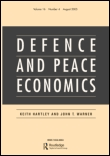
DEFENCE AND PEACE ECONOMICS
Scope & Guideline
Empowering Research in Defense and Peace Economics
Introduction
Aims and Scopes
- Defense Economics:
The journal primarily explores the economic aspects of defense spending, including its impact on national economies, economic growth, and public finance. - Conflict and Peace Dynamics:
It analyzes the economic consequences of conflicts, peace agreements, and military interventions, emphasizing the relationship between economic conditions and stability. - Policy Implications:
Research published often discusses policy recommendations for military expenditures, defense strategies, and international cooperation in defense initiatives. - Geopolitical Analysis:
The journal examines the economic dimensions of geopolitical tensions and security alliances, offering insights into how these factors affect global markets and international relations. - Technological Innovation in Defense:
Another key area is the economic evaluation of defense-related technologies, including military R&D investments and their implications for industry and security.
Trending and Emerging
- Economic Impact of Conflicts:
An increasing number of studies are focusing on the economic repercussions of ongoing and historical conflicts, particularly in relation to market dynamics and economic recovery. - Interdisciplinary Approaches:
There is a notable trend towards interdisciplinary research that integrates economics with political science, sociology, and technology studies, reflecting the multifaceted nature of modern defense issues. - Defense Innovation and Technology:
Emerging themes include the economic implications of technological advancements in defense, such as cybersecurity, AI in military applications, and the role of defense R&D in economic growth. - Public Perception and Military Spending:
Research exploring public opinion on military expenditures and defense policies is gaining traction, highlighting the importance of societal attitudes in shaping defense economics. - Geopolitical Risk and Economic Stability:
There is an increasing focus on the interplay between geopolitical risks and economic stability, with studies examining how these factors influence investment decisions and economic policies.
Declining or Waning
- Traditional Military Expenditures:
Research focusing solely on traditional military expenditures without considering broader economic implications or innovative defense strategies has decreased, indicating a shift towards more comprehensive analyses. - Static Economic Models:
There has been a noticeable decline in the use of static economic models for analyzing defense expenditures, with more emphasis now placed on dynamic models that account for changing geopolitical realities. - Historical Analyses of Military Conflicts:
Studies that concentrate on historical military conflicts without linking them to contemporary economic issues or policy implications are appearing less frequently, suggesting a move towards relevance in current contexts. - Comparative Studies of Traditional Defense Industries:
The focus on comparative analyses of traditional defense industries has waned as scholars increasingly prioritize discussions around innovation, technology, and modern defense strategies. - Narrow Geopolitical Risk Assessments:
Research that examines geopolitical risks in isolation, without incorporating their economic ramifications, seems to be declining, reflecting a need for more integrated analyses.
Similar Journals
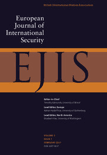
European Journal of International Security
Advancing the discourse on global security challenges.The European Journal of International Security, published by Cambridge University Press, stands as a premier platform for scholarly discourse within the realms of political science, international relations, sociology, and safety research. With its esteemed Q1 ranking in multiple categories for 2023, this journal is recognized for its high-impact research contributions, positioned within the top percentile of its field. Covering a broad spectrum of topics, from security policy analysis to sociopolitical dynamics, the journal aims to foster a deeper understanding of contemporary security challenges while advancing academic inquiry. Notably, with its ISSN 2057-5637 and E-ISSN 2057-5645, the journal provides essential insights for researchers, practitioners, and students alike, affirming its commitment to excellence in the academic landscape of the United Kingdom and beyond. With a converged focus spanning from 2016 to 2024, the journal encourages contributions that critically address the evolving nature of international security in a complex world.
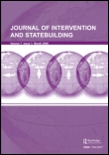
Journal of Intervention and Statebuilding
Fostering Dialogue on Statebuilding ChallengesJournal of Intervention and Statebuilding, published by Routledge Journals, Taylor & Francis Ltd, stands as a pivotal forum for the exploration and analysis of interventions and statebuilding processes across diverse geopolitical landscapes. With a distinguished Q1 ranking in both Law and Political Science and International Relations, this journal is recognized for its rigorous scholarship, offering profound insights into the intricacies of state transitions and international governance. Kept current with a focus on innovative theoretical and empirical research, the journal aims to bridge academic scholarship with policy implications, making it a vital resource for researchers, professionals, and students alike. The journal operates on a subscription basis, ensuring quality peer-reviewed content that contemplates the evolving dynamics of global governance. As it converges from 2014 to 2024, the Journal of Intervention and Statebuilding continues to foster dialogue and contribute to the scholarly discourse in an era of complex state interactions.
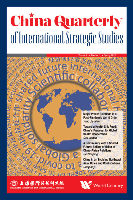
China Quarterly of International Strategic Studies
Exploring the Dynamics of Global StrategyThe China Quarterly of International Strategic Studies, published by World Scientific Publishing Company, is an essential open-access journal dedicated to the interdisciplinary exploration of international strategic dynamics, particularly pertaining to China. Since its inception in 2015 and embracing the open-access model in 2018, this journal has aimed to foster rigorous scholarship in political science and international relations, providing a platform for in-depth research that bridges gaps between theory and practice. With a growing reputation reflected in its Q3 ranking in Political Science and International Relations and a Q4 ranking in Sociology and Political Science for 2023, the journal is positioned to contribute significantly to academic discourse. Researchers and professionals keen on the evolving geopolitical landscape will find valuable insights and analyses, thereby supporting their work and studies in this ever-relevant field. The journal is based in Singapore and provides a global forum for knowledge exchange.

All Azimuth-A Journal of Foreign Policy and Peace
Empowering research for a peaceful future.All Azimuth - A Journal of Foreign Policy and Peace is a leading academic journal dedicated to the exploration and analysis of foreign policy dynamics, conflict resolution, and peace studies. Published by the CENTER FOREIGN POLICY & PEACE RESEARCH in Turkey, this journal serves as a crucial platform for scholars and practitioners aiming to address pressing global issues. With a prestigious Q1 category ranking in Political Science and International Relations, and a noteworthy Scopus rank of #263 out of 706 in its field, All Azimuth is recognized for its impactful contributions to the academic community. The journal, operating under an open access model, is committed to providing unrestricted access to high-quality research, fostering collaboration, and enhancing knowledge dissemination across disciplines. Since its inception in 2012, All Azimuth has become an essential resource for researchers, professionals, and students who seek to deepen their understanding of international relations and peace policies, making significant strides towards resolving global conflicts and promoting sustainable peace.

Journal for Peace and Nuclear Disarmament
Empowering voices for global disarmament efforts.Journal for Peace and Nuclear Disarmament is a leading academic platform dedicated to advancing discourse and research in the critical fields of political science and international relations, particularly in the domains of peace studies and nuclear disarmament. Published by Taylor & Francis Ltd in the United Kingdom, this Open Access journal, which has made significant strides since its inception in 2018, aims to disseminate high-quality research and foster a dialogue among scholars, policymakers, and practitioners. With an impact factor placing it in the third quartile of its category in 2023 and a Scopus ranking of #334 out of 706 in the field, the journal highlights significant contributions to understanding the dynamics of peace and disarmament on a global scale. Offering unrestricted access to its articles, it ensures that vital research is available to a wide audience, thus playing a crucial role in inspiring new ideas and strategies for peacebuilding and the reduction of nuclear arsenals worldwide.
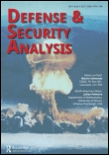
Defence and Security Analysis
Unraveling Complexities of Geopolitical Challenges.Defence and Security Analysis is an esteemed journal that focuses on the critical intersections of security studies, international relations, and geopolitical dynamics. Published by Routledge Journals, Taylor & Francis Ltd in the United Kingdom, this journal serves as a vital platform for scholars, practitioners, and students to disseminate innovative research and insights concerning contemporary defence and security issues. With an ISSN of 1475-1798 and an E-ISSN of 1475-1801, it has achieved a commendable standing, ranking in the Q2 category for Political Science and International Relations and Q3 for Geography, Planning and Development as of 2023. The journal covers a range of pertinent topics with a dedicated convergence of years from 2003 to 2024, making it an invaluable resource for anyone looking to engage deeply with this evolving field. Although it is not open access, its rich content is crucial for informing policy and academic discourse on global security challenges.
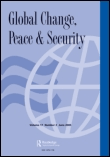
Global Change Peace & Security
Empowering Policymakers with Critical Insights on SecurityGlobal Change Peace & Security is a prominent scholarly journal published by Routledge Journals, Taylor & Francis Ltd, focusing on the intricate interplay between global change and peace efforts within the realms of political science and international relations. With an ISSN of 1478-1158 and an E-ISSN of 1478-1166, this esteemed journal spans from 2008 to 2024, consistently contributing to critical discourse in its field. Ranked in the second quartile (Q2) for both Political Science and International Relations as well as Sociology, it occupies a distinguished position with a Scopus ranking of 134 out of 706 and a percentile standing of 81st in Political Science. The journal’s objective is to bridge the gap between theoretical frameworks and functional policy discussions, thereby fostering dialogue that addresses contemporary challenges in global governance and human security. By offering rich, research-based insights and analysis, Global Change Peace & Security serves as a vital resource for academics, practitioners, and policy-makers committed to advancing peace and security amidst pervasive global transformations.
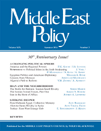
MIDDLE EAST POLICY
Advancing Scholarly Insights on Regional PoliciesMIDDLE EAST POLICY stands as a notable journal in the fields of Political Science and International Relations, published by Wiley in the United Kingdom. With a rich publication history dating back to 1992, this journal provides a critical platform for scholarly exploration and dialogue surrounding Middle Eastern political dynamics and policies. It ranks in the Q3 category in the 2023 evaluations for both Political Science and International Relations and Sociology, indicating its influential role in these academic fields. While it does not offer open access, it is recognized for its rigorous peer-reviewed articles that contribute valuable insights and analyses on pressing regional challenges and institutional frameworks. Researchers, professionals, and students engaged in Middle Eastern studies will find MIDDLE EAST POLICY essential for understanding the complex socio-political landscapes of the region and for fostering informed discussions that advance both scholarship and practice.

Economics of Peace and Security Journal
Connecting Economics with Conflict ResolutionEconomics of Peace and Security Journal, published by ECONOMISTS PEACE & SECURITY, serves as a critical platform for scholarship focusing on the intersections of economics, peacebuilding, and international relations. With an ISSN of 1749-852X, this interdisciplinary journal aims to explore the economic dimensions of peace and security, fostering a deeper understanding of how economic policies can influence stability worldwide. Despite its current standing in the Q4 quartile across various categories, including Economics and Political Science, the journal plays an essential role in advancing research on pressing global issues. By providing insightful analyses and empirical studies, it engages researchers, students, and policymakers in discussions that can lead to effective strategies for conflict resolution and sustainable economic practices. Although it currently offers limited access options, the aspirations for broader dissemination underscore its importance in contributing to the ongoing dialogue surrounding peace and security economics. Join the conversation and contribute to this evolving field as it navigates a complex and dynamic global landscape.
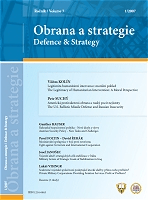
Obrana a Strategie-Defence & Strategy
Bridging Gaps in Defense Research for Informed Decision-Making.Obrana a Strategie-Defence & Strategy is a prominent academic journal dedicated to the critical fields of Political Science and International Relations, as well as Safety Research. Published by the esteemed UNIV DEFENCE, CENTER SECURITY & MILITARY STRATEGIC STUDIES in the Czech Republic, this open access journal has been offering unrestricted visibility to its research outputs since 2001, fostering a culture of knowledge sharing among scholars and practitioners. While currently positioned in the Q4 quartile in its categories and maintaining a Scopus rank that places it in the lower percentiles, the journal serves as a vital platform for emerging discussions on military strategy, defense mechanisms, and global security issues. With an aim to bridge the gap between theoretical frameworks and practical applications, Obrana a Strategie-Defence & Strategy contributes to shaping insights that are essential for informed decision-making in contemporary defense and strategic studies. Whether you are a researcher looking to publish your findings or a student seeking to engage with current academic debates, this journal represents an invaluable resource in the ongoing exploration of security dynamics.